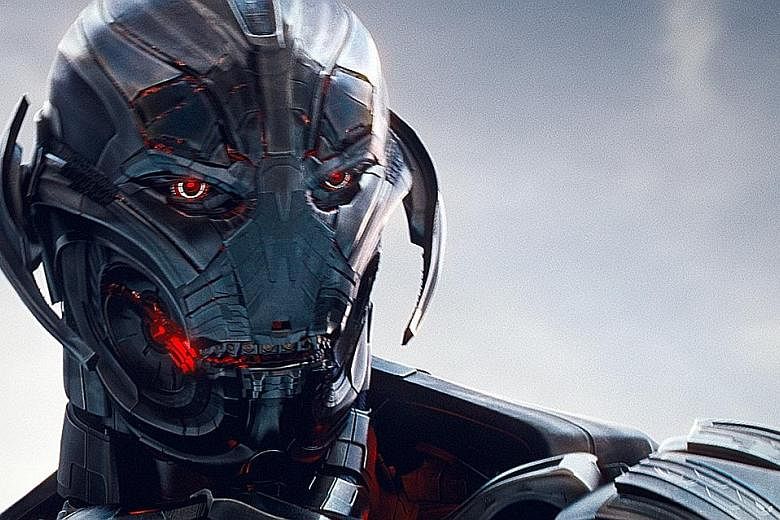NEW YORK • A technology used to animate the faces of digital superheroes in Deadpool (2016) and Avengers: Age Of Ultron (2015) is at the centre of a legal battle that may cause some super-headaches in Hollywood.
The spat is over who owns a novel method of electronically capturing the performances of human actors, including every smile and twitch of their facial muscles, and using the data to bring computer-generated characters to life onscreen. The technology, called Mova, won a technical Academy Award for a group of developers last year.
This month, Rearden, the technology incubator in San Francisco that developed Mova, countersued a Chinese company that has claimed ownership of the technology. Rearden, founded by Silicon Valley serial entrepreneur Steve Perlman, is claiming a string of patent and copyright violations.
It has asked a judge to award it financial damages and block the distribution of movies and other entertainment that it says have been made by infringing Mova patents and trademarks.
A news release that Rearden planned to release yesterday about its countersuit identified the movies, which include Deadpool, Terminator Genisys (2015) and Guardians Of The Galaxy (2014).
Mr Travis W. Thomas, an intellectual-property lawyer at Baker Botts, said it is conceivable that a court could eventually block the distribution of the movies, but added that it is a "long shot" for Rearden.
Rearden's suit follows one from the Chinese company that has claimed ownership of Mova, Shenzhenshi Haitiecheng Science and Technology.
Shenzhenshi, which is affiliated with well known Hollywood visualeffects company Digital Domain, sued Rearden in February last year as both parties began to tangle over who owned the technology.
It is now commonplace for moviemakers and gamemakers to animate characters through motion capture, which typically involves placing markers all over the bodies of actors, so cameras and software can record their movements.
Nearly a decade ago, Mr Perlman introduced Mova, which is designed to more faithfully capture the subtleties of facial expressions.
Mova does this by dusting the faces of actors with phosphorescent make-up and using customised hardware and software to capture the performances and convert them into data.
Mova was used to help Brad Pitt's character in The Curious Case Of Benjamin Button (2008) appear to age in reverse and was a part of the effects in Gravity (2013), Harry Potter And The Deathly Hallows: Part 2 (2011) and many others.
The strange story of how Mova's ownership came to be contested resembles the twists and turns of a movie plot.
Mr Perlman founded and controlled online game start-up OnLive, which he merged with Mova. But as the start-up struggled, he left in 2012. The countersuit against Shenzhenshi that Rearden filed this month says that OnLive decided to sell Mova's assets later that year and Mr Perlman decided to acquire them from OnLive's controlling investor.
He tasked a Rearden employee who worked on Mova motioncapture projects, Mr Greg LaSalle, with managing the process. But Mr LaSalle negotiated to sell Mova's assets improperly to Digital Domain, Mr Perlman said in the suit, which was filed in a District Court in San Francisco.
Shenzhenshi said in its lawsuit last year that it had acquired Mova in May 2013 legitimately from Mr LaSalle for an undisclosed amount.
It said that Mr Perlman had been unable to make a successful business out of Mova and had encouraged Mr LaSalle to try to salvage it on his own.
Mr Perlman's later desire to regain control of Mova stemmed from "a severe bout of 'seller's remorse'" after publicity about the Oscar related to the technology, Shenzhenshi said in its suit.
Shenzhenshi is "closely related" to Digital Domain and its Hong Kong-based parent company, Digital Domain Holdings, Rearden said in its countersuit. Digital Domain Holdings has teamed up with Hong Kong actor Nicholas Tse to expand its virtual-reality business in China.
Lawyers for Shenzhenshi did not respond to repeated requests for comment.
Mr LaSalle now works for Digital Domain, where he is listed as director of visual development. A spokesman for the company did not respond to requests for comment and Mr LaSalle could not be reached.
In recent interviews about Deadpool, one of this year's biggest hits, Mr LaSalle has said that he performed the facial expressions of its animated metallic superhero, Colossus.
NEW YORK TIMES

